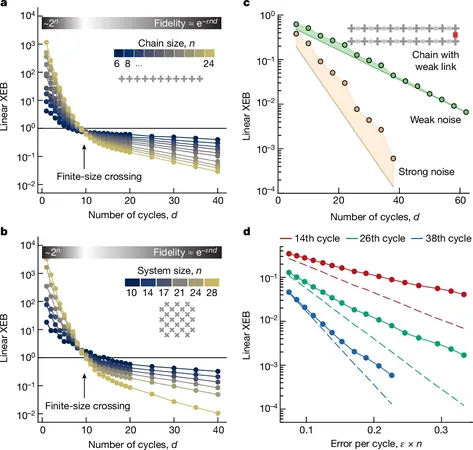
Breakthrough in Stem Cell Research: A Game-Changer for Rare Diseases
2024-10-14
Author: Yu
In a remarkable shift within the pharmaceutical industry, stem cell therapies are proving to be more than just a scientific curiosity—they are on the verge of becoming pivotal in the treatment of rare diseases. Historically viewed with skepticism due to their scientific complexity and regulatory challenges, advancements in research and successful clinical trials are now reshaping perceptions.
RHEACELL: A Leader in Stem Cell Research
At the forefront of this revolution is RHEACELL, a distinguished integrative biopharmaceutical company based in Heidelberg, Germany. With over two decades of experience in stem cell research, RHEACELL is engaging in multiple national and international clinical trials, many of which have progressed to Phase 3. These innovative treatments offer hope for diseases deemed untreatable, addressing a dire need considering that only about 5% of the 6,000–10,000 known rare diseases currently have available treatments. Most companies are reluctant to invest due to the financial risks associated with low patient populations, but RHEACELL is defying the odds.
ABCB5-Positive Mesenchymal Stem Cells
RHEACELL's approach centers on ABCB5-positive mesenchymal stem cells (MSCs), a specialized type of stem cell hailed for their powerful anti-inflammatory and regenerative properties. Derived from skin tissue, these cells carry the ABCB5 transporter, which is crucial in shielding tissues from damage while promoting healing. This innovative methodology shines particularly in treating epidermolysis bullosa (EB), often referred to as "butterfly disease," which affects approximately 500,000 individuals globally and leads to significant suffering due to its harsh symptoms, including painful blisters and potential life-threatening complications.
Visionary Leadership
Dr. Christoph Ganss, the visionary behind RHEACELL, emphasizes the importance of bridging research, medicine, and business. His journey from clinic to company founder exemplifies a commitment to enhancing patient lives. "Our ABCB5+ mesenchymal stromal cells can significantly improve the quality of life for many patients and represent a potential turning point in treating diseases like EB," Dr. Ganss shared, reflecting on the heartfelt messages received from trial participants expressing their gratitude for improved well-being.
Regulatory Recognition
In acknowledgment of RHEACELL's innovative work, regulatory authorities have taken note. In December 2023, the U.S. Food and Drug Administration (FDA) awarded RHEACELL a Rare Pediatric Disease Priority Review Voucher for their efforts in treating EB, soon followed by a Regenerative Medicine Advanced Therapy designation in February 2024. These designations are crucial as they streamline the development timeline for vital treatments targeting serious conditions.
Wider Applications and Future Challenges
While the focus on EB is profound, RHEACELL's vision extends beyond a single disease. The applications for ABCB5-positive MSCs are far-reaching and hold promise for treating various inflammatory and degenerative diseases with pressing therapeutic needs. RHEACELL has already achieved significant milestones, including national marketing authorization for treating chronic venous ulcers (CVU), marking a groundbreaking step in their mission.
As RHEACELL gears up for future clinical trials and aims to expand its offerings, challenges remain. The complexities of stem cell research and regulatory scrutiny can deter many; however, RHEACELL persists due to its unwavering dedication to scientific excellence. Dr. Ganss recalls the skepticism they faced initially but views the recent favorable regulatory assessments as validation of their journey. "We will continue to push forward—developing new drugs, expanding our production capacities, and seeking partners for global commercialization to meet the demand for our cells."
Conclusion
This groundbreaking work is not just about advancing medicine; it is about restoring hope and enriching the lives of those affected by rare diseases. With innovators like RHEACELL leading the charge, the future looks promising for treatments that many thought were out of reach. Are we on the verge of a medical breakthrough that can change the fate of rare disease patients worldwide? The answer might just lie in the power of stem cells.



 Brasil (PT)
Brasil (PT)
 Canada (EN)
Canada (EN)
 Chile (ES)
Chile (ES)
 España (ES)
España (ES)
 France (FR)
France (FR)
 Hong Kong (EN)
Hong Kong (EN)
 Italia (IT)
Italia (IT)
 日本 (JA)
日本 (JA)
 Magyarország (HU)
Magyarország (HU)
 Norge (NO)
Norge (NO)
 Polska (PL)
Polska (PL)
 Schweiz (DE)
Schweiz (DE)
 Singapore (EN)
Singapore (EN)
 Sverige (SV)
Sverige (SV)
 Suomi (FI)
Suomi (FI)
 Türkiye (TR)
Türkiye (TR)